#gnostic christianity
Text
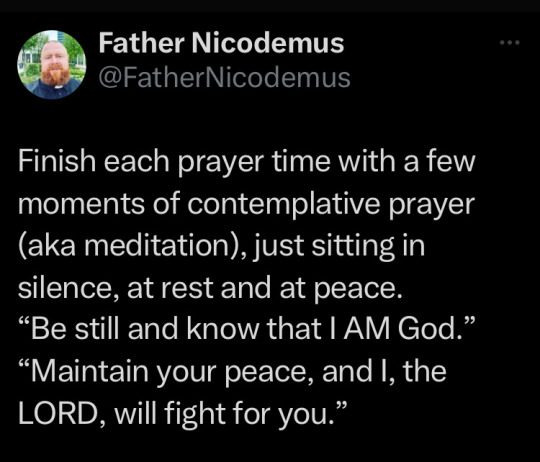
#meditation#philosophy#spirituality#enlightenment#mindfulmeditation#mantra#advaita#illumination#mysticism#jesus christ#god#yahweh#father#gnostic christianity#orthodox christianity#christianity#catholic#prayer#unitarian#universalism
98 notes
·
View notes
Text

Spiritual discipline is what awakens us to divine reality, not belief.
Gnosis signifies knowledge from experience. Gnosticism, as a field of study, pertains to all the ancient schools of mysteries from both East and West, whose scriptures encompass the practical science of awakening consciousness. Gnosis is not isolated to the first Christians, but permeates all times, cultures, and spaces, for while consciousness is universal, the means of expressing such experiential wisdom of the divine is temporal and idiosyncratic to the language, mentality, and needs of a particular society.
Gnosis is what we have verified through experience and experimentation, predicated upon practical methods and personal effort. It is never the product of a belief system, of adopting a religious or mystical attitude, demeanor, or behavior. It is never achieved through attendance, adherence to, or acceptance from a group, by believing in doctrine or creed. It is the flowering and natural unfolding of the soul, which is created and developed when the proper causes and conditions have been met.
Just as there are laws that govern the physical universe, so too are there spiritual laws, causes, and methods to originate the soul: the awakening of the consciousness.
Therefore, the Greek term γνῶσις gnosis is synonymous with genuine faith. Faith has nothing to do with belief, with accepting or rejecting a concept in the mind or upholding a sentiment in the heart. Faith is what we know from facts, from witnessing and understanding reality. Belief takes no effort to foster or develop, whereas the awakening of consciousness and divine experience requires tremendous discipline and the application of spiritual works.
Read or listen to the entirety of this article:
#gnosticism#gnosis#gnostic#chicago gnosis#samael aun weor#gnostic academy of chicago#gnostic tradition#gnostics#gnostic teachings#gnostic bible#gnostical#gnostic christianity#gnostic gospels#spirituality#awakening#meditation#how to meditate#meditation podcasts#spiritual podcasts#spiritual podcast#spiritual exercises#spiritual life#spiritual path#spiritual growth#spiritual journey#spiritual development#spiritual awakening#spiritual disciplines#spiritual enlightenment#spiritualgrowth
50 notes
·
View notes
Text

Roman Empire Flag (if the Roman Empire converted to Gnostic Christianity)
#flags#roman empire#roman#ancient rome#flag design#vexillology#roman eagle#rome#roman art#roman flag#alternate history#alternate universe#alternate reality#art#flag art#original flag#fictional flag#purple and gold#purple and yellow#gnostic christianity#gnosticism#christian art#religious art#religious flag#coptic cross#beautiful flag#sun cross#cross
86 notes
·
View notes
Text
Im baptised Anglican. But it wasn't ever about the Church.
It was about me. The Holy Spirit. Sophia. Jesus.
About me finding myself. About learning /attaining Gnosis. About seeing God, the Gods, in my own way. It was about Marian Consecration. About love and peace.
*not* the church.

#christo pagan#christopagan#christopaganism#holy mother#god the mother#great mother#great goddess#folk catholicism#english folklore#folk religion#english folk magic#queer anglican#lgbt anglican#gay anglican#anglican#lgbtq community#lgbt christian#gnostic gospels#gnostic christianity#gnosticism#sophia#holy sophia#oceannotfound posts#oceannotfound blogs
26 notes
·
View notes
Text
Are you interested in paganism, polytheism, witchcraft or the occult?
Then have I got the server for you!
I’m opening the gates to my server Pagans, Polytheists and Pals! It’s a server for people of all faiths to come together and learn about
Paganism
Polytheism
The Occult
Wicca
Witchcraft
Old Faiths
Mythology
Satanism
Philosophy
And much more!
We also host game and debate nights, and have a relaxed calm environment. Come discuss the faiths of old, and join our server today!
#hellenic deities#hellenic polytheism#paganism#heathenry#norse paganism#celtic#witchcraft#witchblr#discord chat#polytheism#polytheist#occult#satanism#lucifarian#the occult#esoteric#gnosticism#gnostic christianity#hermeticism
38 notes
·
View notes
Text
For Unitarians the problem with trinity is not that it adds divinity to Jesus, but that it takes divinity away from the rest of us, singling out Jesus as unique. We are all children of God, we are all one with the Father. Jesus is divine as so are we - “You are all gods” Isaiah.

#catholic#christianity#gnostic christianity#god#jesus#jesus christ#jesusisgod#meditation#mysticism#orthodox
25 notes
·
View notes
Text
everyday i wake up and discover a new reason the gnostics were right
15 notes
·
View notes
Text
Whoever attains “ The True Gnosis” of his being becomes a “ Sun GOD”, a “ God-Man”, a “ Primordial Man”, a “ Heavenly Man”, a “Cosmic Christ” while yet in his mortal body, and acquires supremacy over all things. Immortal is the one that have accomplished “The Great Work”, he will inherit The Celestial Kingdom. Father, transmute us from lead to gold, from the unreal to the real, from darkness to light! from death to life ! I honor my inner Christ, The androgynous Spiritual Sun, The Word made flesh ! The Solar Logos!
Inverential peace!
Cosmic Christ
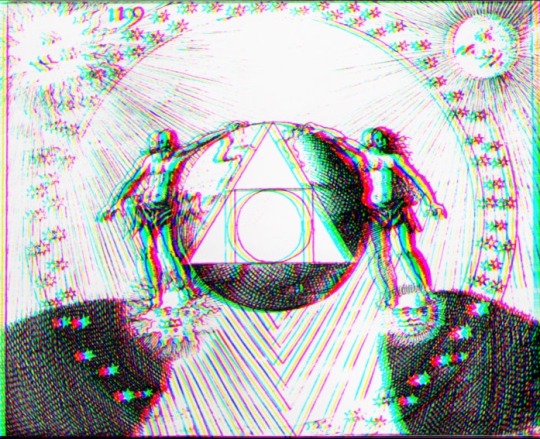
#transmutation#gnosis#sungod#divine wisdom#cosmic consciousness#self realization#regeneration#resurrection#spiritual alchemy#enlightenment#logos#rebirth#hermeticism#gnostic christianity
14 notes
·
View notes
Text
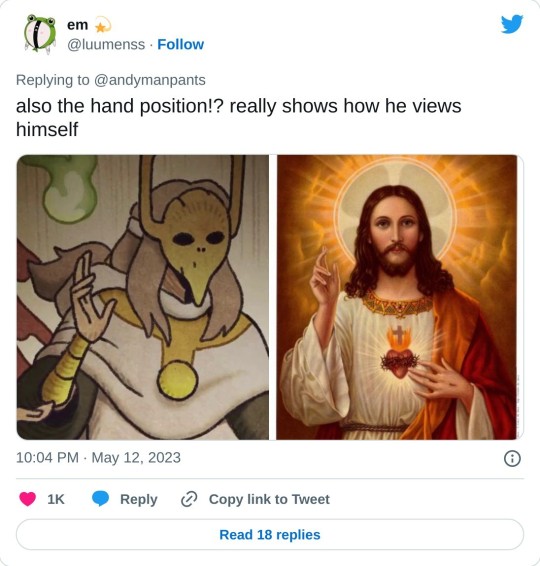

#the owl house#owl house#emperor belos#the owl house belos#Belos#the owl house phillip wittebane#wittebane brothers#philip whittebane#belos is philip#jesus christ#christianity#gnostic christianity#gnostic teachings#gnosticism#gnostism#papa titan#king’s dad#titan#titans
26 notes
·
View notes
Text
My two cents here on the "word of God."
My two cents here on the "word of God." The Essenes where the true Church of Jesus - the true Christian church. They literally practiced what Jesus taught. They owned nothing and shared everything. Even the Romans respected them and wrote a lot about them (before they killed them). Some claim that Jesus was an Essene. Before they were killed they hid their scriptures for future generations and we found them, we call them The Dead Sea Scrolls. Edgar Cayce even mentioned these. These scriptures were the same scriptures that the Gnositcs had who were completely wiped out by the ROMAN Catholic church.
Jesus was killed by the Romans, the Essenes were killed by the Romans, the Gnostics were killed by the ROMAN Catholic church, who gave us a book we call the word of God because it survived. Well, all these other books that have been recently found survived also. This bible we call the word of God is the same book that Netanyahu quoted from to justify killing Palestinians.
I can't think for you. God help you if you dare to question the "WORD OF GOD." But who named it the word of God? Says who? I'm not going to say it is completely false, but I will not call it the word of God until maybe I hear this from the lips of an angle from God. Not some preacher from a pulpit putting everybody down and asking for money. I will certainly question it and I don't believe that God ordered anybody to kill anyone. Because my God does not need me or anyone else to do his killing for him, he is all powerful and can do that himself. Just saying.
#WordOfGod
6 notes
·
View notes
Text

"Then Peter said to Mary, "Sister, we know that you are greatly loved by the Saviour, more than any other woman. Tell us those words of His that you remember, the things which you know and we don't, the teachings we never heard."
Mary answered, saying: "What is hidden from you I shall reveal to you. Whatever is unknown to you, and I remember, I will tell you."
And she began saying these words to them.
She said, "Once I saw the Lord in a vision and I said to him:
'Lord, Rabouni, now I see you in this vision.
He answered me and said: 'Blessed are you Mary, for you do not waver at the sight of me. How wonderful you are! For this is where the treasure lies - in the nous, that place where heaven and earth meet, where deep understanding arises in the heart and mind."
I asked him this: 'Now tell me Lord, how does a person see such a vision, is it through their soul or through the Spirit?
asked him this: 'Now tell me Lord, how does a person see such a vision, is it through their soul or through the Spirit?
The Saviour answered: 'It is neither through the soul nor through the Spirit, but through the nous, the understanding which arises between the two, that is how the vision is seen."
-Gospel of Mary page 10.
#books#history#literature#religion#theology#mysticism#esotericism#religious#gnosticism#gnosis#gnostic teachings#gnostic gospel#gospel of mary#gnostic writing#esoterica#esoteric#gnostism#gnostic christianity#secret teaching#book quotes#book#reading#aesthetic#christian aesthetic#religious aesthetic#religious imagery#mary magdalene#ldr#ldr aesthetic#lan del rey
16 notes
·
View notes
Text
Life is a dream.
God is the dreamer.
God is dreaming about us, what it is like to be us and what we do.
Our ego/personality is just a character god is dreaming.
When our lives end, our true self, God, merely wakes up and returns to being Himself.
So we never really die, we Iive on with, through and in God.
#meditation#buddha#philosophy#spirituality#enlightenment#mindfulmeditation#mantra#advaita#illumination#mysticism#jesus christ#catholic#gnostic#gnostic christianity#nonduality#nondualism#gospel#christianity#unitarian#universalism#jesus#life after death#kingdom of heaven#god#yahweh
33 notes
·
View notes
Text

The controversial Gospel of Judas is a powerful scripture depicting the relationship between betrayal and transcendence. While religious groups intensely, fearfully, and dogmatically contest its authenticity, this scripture is clarified through a comparative study of Samael Aun Weor's writings. Just as an actor plays a part in a film and should not be condemned for it, likewise the Apostle Judas should not be denigrated for the role he played in a necessary cosmic drama led by Jesus, the Master Aberamentho. By understanding who Judas is in us, we can better understand the ways we betray our own selves while striving for divine reality.
#gnosticism#gnosis#gnostic#chicago gnosis#samael aun weor#chicago gnosis podcast#gnostic kabbalah#gnostic tradition#gnostics#gnostic bible#gnostic teachings#gnostic christianity#gnostic gospels#gnostical#samaelaunweor#judas iscariot#jesus x judas#esoteric christianity#christian faith#jesus christ#christianity#christian doctrine#christian bible#spiritual#spiritual initiation#spiritual enlightenment#temptation#mysticism#alchemy#kabbalah
29 notes
·
View notes
Text
I like Gnosticism. This polytheistic version of Christianity wherein the material world was created by a fake god, Yaldabaoth/The Demiurge. This was the god of the old testament, I believe. And the New Testament was about Jesus coming to try and teach people about the truth behind the formation of the earth. I don't know it all too well (I'm no scholar), but I like what I heard. I also like the idea I heard wherein Jesus dying and coming back to life was possible because Christ (one of the many gods) entered his body when he was baptized and left his body when he was nailed it the cross. It'd interesting. I'd love to see some YA Fantasy take on the Gnostic mythos. It would have to be a YA Fantasy style book though, because I struggle to read anything beyond the Percy Jackson or Harry Potter level. And the old english of the religious texts is impossible to understand for me. Here's a link to a page I read once on the subject of Gnosticism:
#gnosticism#I made a post like this before#but I'd love a Gnostic book#written like#percy jackson#or something#it'd be so good#gnostic christianity#pjo#pjo hoo toa#rick riordan#riordanverse#my thoughts#story ideas#book ideas#percy jackon and the olympians#percy jackson and the olympians
8 notes
·
View notes
Text
Tryna explain my religion but it will never work lol
The Cycle Of Life And Death And Rebirth
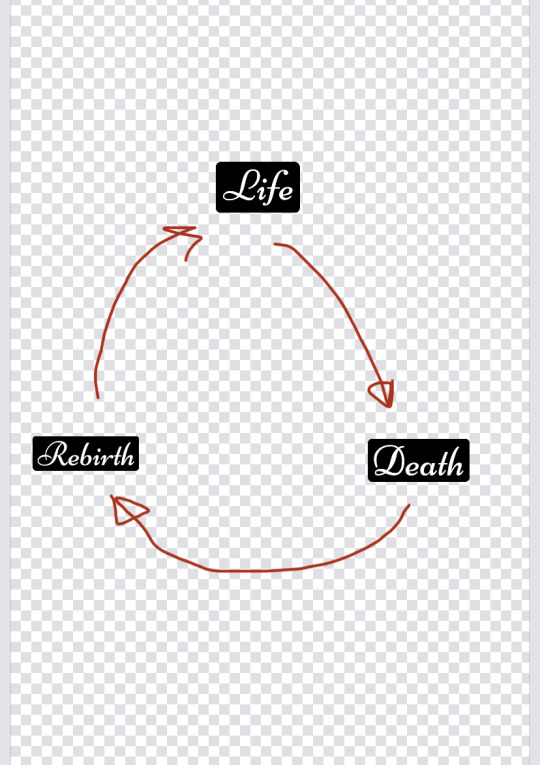

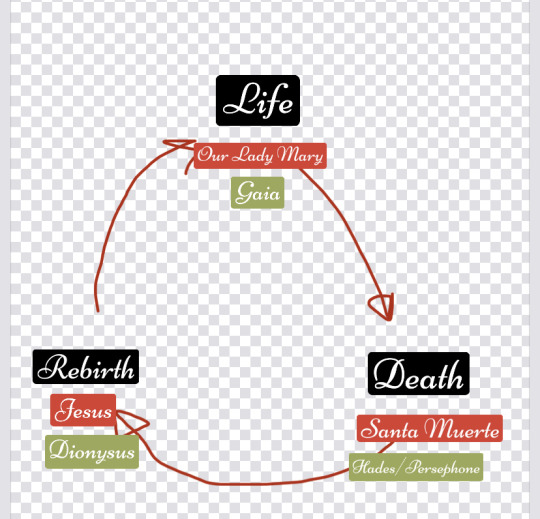
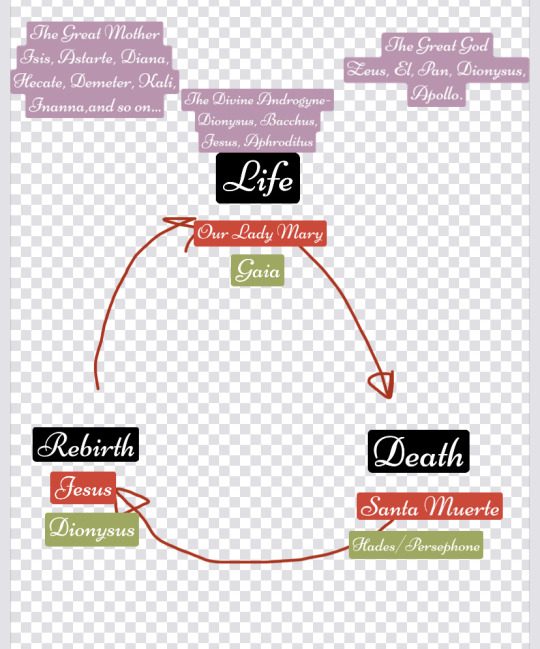
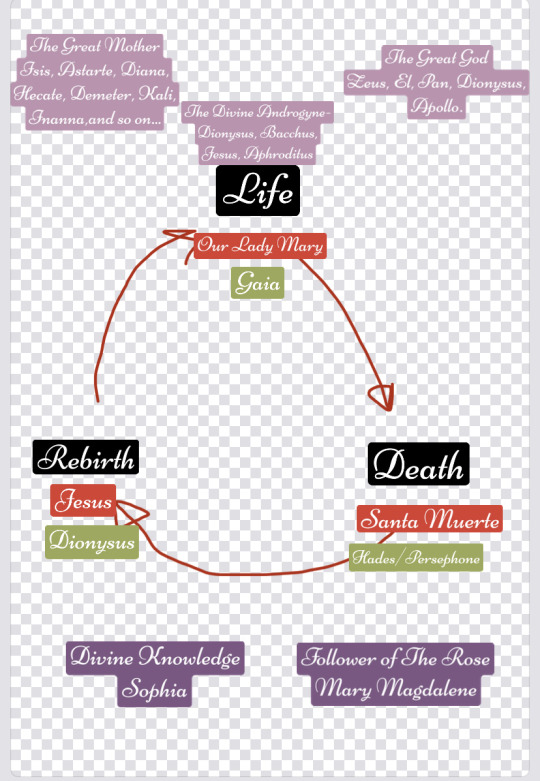
Heres my explanation on how I see Gnosticism
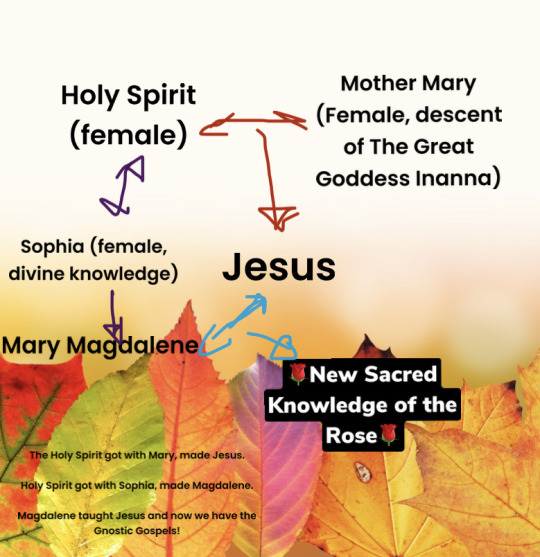

I always refer to Jesus and Mary Magdalene making the "gnostic gospels" as.. the knowledge of the sacred rose i.. dunno why.
It makes sense to ME. And thats ok. Im fine if no one understands how i fit Gnosticism into Paganism.
#religious ramblings#folk religion#goddess religion#gnosticism#gnostic#gnostic christianity#mary magdalene#sophia#gnostic sophia#goddess Sophia#christo pagan#hellenic paganism#paganism#santa muerte#mother mary#great goddess#christopagan#oceannotfound blogs#oceannotfound posts
42 notes
·
View notes
Text
In Modalism there is only one God, Yahweh, our Father.
•Jesus is the Son of God, the manifestation of the Father in human form.
•The Holy Spirit is the Spirit of God, the presence and power of God active in the world and our lives.
-> Note that the Son and Spirit are ‘of God’ but the father is not the ‘father of God’ rather the Father is God directly.
•The Father is not a manifestation of God, the Father is the source of the manifestations. God our Father, Yahweh, is the one true God and source of both the son and Spirit which are physical and spiritual manifestations (within creation) of God our Father.
•In short, Jesus is not God our Father, but he is the human manifestation of God our father, one with the father but not the same as the father.
#catholic#christianity#gnostic christianity#god#jesus#jesus christ#jesusisgod#meditation#mysticism#orthodox
18 notes
·
View notes